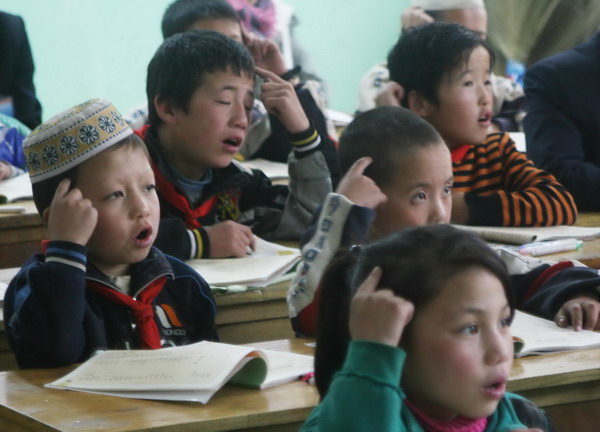Schools provide a class act for success
Updated: 2011-09-28 07:50
By Zhu Zhaoxu (China Daily)
|
|||||||||
'Wings' for migrants
As export of labor is a major source of income for residents, Gao said education makes sense to migrant workers as well.
Most of Dongxiang's 65,000 migrant workers perform tough, manual or tedious jobs, such as washing dishes in restaurants or building and maintaining roads on the Tibetan plateau.
They would have a much better life if they are better educated, Gao said.
Migrant work contributed 29 percent to local farmers' income last year.
"The Dongxiang ethnic group is very intelligent and diligent," Gao said. "They should be endowed with wings of knowledge to fly higher."
|
 Ma Zhongxiang (left), a third-grader at Wangji School in Dongxiang, learns how to pronounce 'head' in English. [Photo/Agencies]
|
Staying in school
To curb the school dropout rate, the government has launched an extensive campaign to publicize the Compulsory Education Law, with banners and slogans exhorting the value of education posted in virtually every village in Dongxiang.
Government employees at various levels have also signed "agreements" with local schools to help dropouts get back to school, Gao said.
Zhou Wenhua, an imam at Qiangtou Mosque, one of the 38 mosques in Zhaojia township, said: "Islam stresses the importance of education, so at each religious gathering, I preach the teachings, encouraging parents to ensure their children have decent schooling."
Over the past three years, 2,100 junior high students and 680 elementary students have returned to school after initially dropping out, according to education bureau statistics.
Back at Gudu Elementary School, its headmaster Ma is experiencing another rub in Dongxiang's education.
"We may have to bid adieu to Gudu and go where there is a kindergarten for my child, now 3 years old," he said.
There are only three kindergartens in Dong-xiang catering to 386 kids, while the number of children aged 4 to 6 is 15,094, according to the latest statistics of the education bureau.
As the language of the Dongxiang ethnic group is only oral, it is imperative for more children to attend kindergartens, since bilingual education at an earlier age will make them linguistically prepared to receive schooling and interact with people outside Dongxiang, said bureau chief Zhang.
The county has decided to set up 26 kindergartens in five years to solve the problem facing people like headmaster Ma, he said.
As with other projects in the education sector, building kindergartens and boarding schools needs financial support from agencies at both provincial and national levels, he said.











